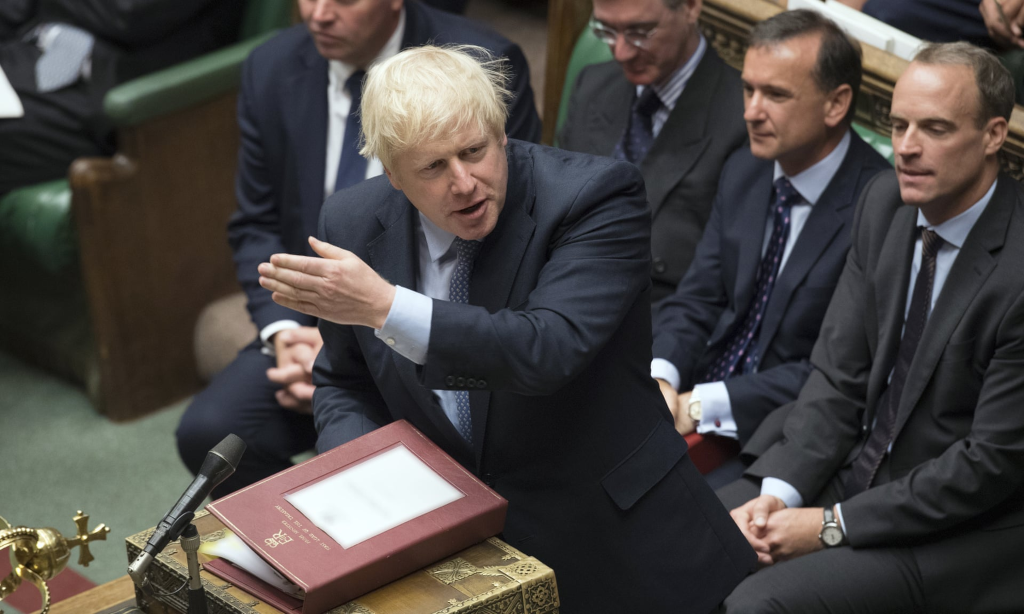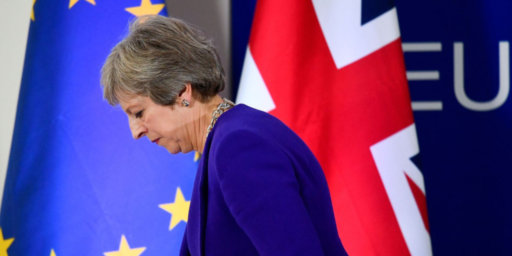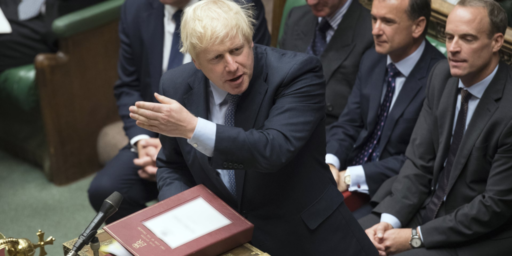Boris Johnson Could Face No-Confidence Vote Next Week
Next week could be a crucial one for Boris Johnson's future in power.

British Prime Minister Boris Johnson could face a no-confidence vote in the House of Commons as soon as next week, placing his continuation in power in doubt even as he seeks to reopen talks with European Union representatives:
There could be a vote of no confidence in the government next week in order to remove Boris Johnson as prime minister and secure a Brexit date extension, a senior Scottish National party MP has said.
Following talks between opposition party leaders at Westminster, Stewart Hosie said the move appeared to be the only way of ensuring Johnson did not push through a no-deal Brexit on 31 October.
“We have to do that because there is now no confidence that the prime minister will obey the law and seek the extension that parliament voted for only a few weeks ago,” he told BBC Radio 4’s Today programme.
“If we are serious about the extension, that is the only game in town.”
Hosie, a former SNP deputy leader, said the aim was to stop a no-deal Brexit, and that all opposition parties and Tory rebels needed to be united.
The SNP MP urged the Liberal Democrat leader, Jo Swinson, to get behind the move, which could lead to Jeremy Corbyn being installed in No 10. Swinson has previously said she would not put Corbyn in Downing Street, even for a short period.
“If another name came forward that was acceptable to everybody – a Ken Clarke or Dominic Grieve-type figure – then self-evidently that would be a good thing to do,” Hosie said. “But it is also self-evidently the case that the second-largest party [Labour] should have the first chance to form that administration.
“If Jo Swinson and the Lib Dems are actually serious about stopping Brexit then they need to stop playing political games [and] get on board with everybody else.”
Hosie said it was a short-term procedure to get an extension to article 50 and then have a general election.
This latest move comes at the end of a rather hectic month for Johnson that saw him suffer successive defeats even as it seemed he was getting the nation closer to an exit from the European Union. It began at the end of August with the new Prime Minister seemingly calling his opponents bluff by persuading Queen Elizabeth II to suspend Parliament for an unusually long five weeks, a move that was essentially designed to prevent any legislative moves to block a no-deal Brexit at the end of October. Not surprisingly this was not well-received either by the general public or by members of Parliament, including members of Johnson’s own party. When Parliament returned in the middle of the month, it struck back at Johnson by causing him to suffer a string of legislative defeats, including the passage of legislation that would bar a no-deal Brexit at the end of October and blocking his efforts to call a snap election that would have taken place immediately before the October 31st Brexit deadline. Additionally, Johnson suffered defections from within his own party, with several Tory members crossing the aisle to sit with the anti-Brexit Liberal Democrats.
Ultimately, of course, Parliament was suspended as Johnson wanted, but that wasn’t the end of his problems. Opponents took to the courts to stop what they contended was an illegitimate and illegal suspension. While the courts in England and Northern Ireland upheld the suspension, the Scottish High Court said the suspension was illegal and implicitly found that Johnson had misrepresented the reasons for the suspension to Queen Elizabeth when he sought Royal Assent for the move. At the start of this week, of course, the Supreme Court of the United Kingdom agreed with their brethren in Scotland and held the suspension to be illegal. As a result, Parliament has been back in session since Wednesday and Johnson’s fate hangs in the balance.
Whether the no-confidence vote actually goes forward will no doubt depend on a number of factors.
The first, of course, is the question of whether or not the anti-Johnson forces in the House of Commons can agree on a course forward. The biggest obstacle in that regard appears to be who would serve as Prime Minister even on a temporary basis. The Liberal Democrats, whose support is crucial to any such measure succeeding, have objected to the idea of Labour Party leader Jeremy Corbyn taking the position and even some Labour MPs reportedly aren’t entirely thrilled by the idea.
The second question is the somewhat related one of whether a vote of no-confidence would succeed. This, of course, would require a majority vote in the House of Commons and would depend largely on whether or not the many Tory backbenchers who have rebelled against him would vote with the opposition. According to some estimates, there have been enough defections from the Tory side that Johnson no longer has a working majority even when you take the cooperation of the Democratic Unionist Party, and even that may be in doubt due to the issues surrounding the fate of the Irish Border in a post-Brexit world. Obviously, an unsuccessful no-confidence vote would embolden Johnson in his Brexit strategy.
The final question, of course, is what happens after a no-confidence vote. The most likely outcome would be an election at some point in November, and current polling indicates that the Conservative Party would walk away with a victory that would nearly guarantee Johnson staying in power until 2024 at least. Are the opposition parties willing to take that risk? That’s a question they’ll have to ask themselves.





It will come down to the voters. The same voters who fell for BoJo’s lies about Brexit. I’m not optimistic.
If Labor (Labour) had anyone but Corbyn. . . Brexit plus hardcore socialism? That’s compounding a catastrophically stupid mistake. Britain is going to need the capitalist engine to save it from economic decay. OTOH, Johnson is a malignant twat.
@michael reynolds: Not just the voters, but the electoral system that could take a plurality and turn it into an absolute majority for Johnson in parliament (which is how they got into this mess in the first place, back with Cameron).
Hope they’re doing their sums right, have their ducks in a row, all that kind of stuff. If they pass a no-confidence motion on Monday (Sep 30), Boris doesn’t resign, then the opposition fails to form a government, I understand that means Parliament is dissolved Oct 14 and Boris is the caretaker until the election with only tradition to restrain him. I can think of a variety of shenanigans he could get up to in that situation that produce no-deal on Oct 31.
American politics look positively tame and well ordered in comparison.
@OzarkHillbilly:
To be honest, I think it is the reverse. British institutions are trying to sort through the mess created by Brexit and the main problem is that the public is deeply divided on a way forward.
Meanwhile, in the US our problems all stem from institutions that gave power to the person that a minority wanted in office, with legislative blockage emerging from a chamber controlled by a minority as well.
And Johnson, as much as he is clearly a disaster, at least understands his job.
Now, Brexit may prove more disastrous to the UK than Trump will be to the US over the long run (but even there, I am no so certain).
I think the U.K. may be in a worse position….there’s been a lot of screeching about the recent Supreme Court (U.K.) decision and a lot of “how dare they make a decision on this matter!”
It’s as if Marbury v. Madison had just been decided 10 years ago; there was nothing written down in the Constitution as to who had supreme legal authority. And that we had Trump battling out decisions with Congress.
It’s time.
The government have been raising the rhetorical stakes, insisting that anti-No Deal legislation is a “surrender Act”, verging on excusing radical Leaver violence, continuing to hint at a refusal to obey the law requiring extension over No Deal. And the UK “negotiations” in Brussels are patently farcical.
Enough.
People are saying this is playing into Wile E. Cummings plans for a “people vs elite” campaign.
Screw it.
He may quote Sun Tzu or Machiavelli; I’ll quote that savvier philosopher Mike Tyson:
Cummings wants a knife fight?
Bring on the heavy howitzers.
The votes are there to win a VoNC.
It would clearly be better if Corbyn were to step aside for a respected retiring MP like Margaret Beckett or Ken Clarke.
But if he and his acolytes are so short-sighted as to insist on satisfying their amour propre and one upping the LibDems, so be it.
Better Corbyn than No Deal.
(My record of political prediction continues:
“Cameron will be in coalition again..”
“Remain will win the referendum…”
“Trump can’t win the nomination…”
“Trump will never get elected…”
“Johnson has blown his chance of becoming PM…”
“Corbyn will never be PM…”
“I’d never support Corbyn as PM…”
Don’t bet on the horse I tip, folks!
@Steven L. Taylor:
The possible quirks of the British voting system in a three-and-half way fight (plus the variations in parties in N Ireland, Scotland, and Wales) are enough to give me the heebie-jeebies.
But I still don’t see how Johnson can win a majority, even if the Conservatives have the largest minority percentage at the polls, if the Brexit Party are gnawing at the Leaver vote in Lab/Con marginals, the SNP are set to hammer the Tories in Scotland, LibDems are picking up centrist votes in the Con/Lib marginals, and Corbyn-phobes more confident he will be restrained by Libs and SNP.
Unless the Labour vote in Leave inclined areas collapses, another hung Parliament looks likely, with a combined anti-Con coalition likely.
My worry is that some in Corbyn’s leadership group still regard the LibDems as the real obstacle to their long-term political strategy.
@JohnSF:
Assuming the no-confidence plot goes forward, what will Corbyn tell the EC later this month about the post-election Parliament? We’ll be ready to vote for May’s deal? We’ll be ready to throw Northern Ireland under the bus and put a hard border in the Irish Sea? We’ll be ready to rescind the Article 50 notice? We’ll be ready to approve a year or two extension? We’ll probably be back in three months to ask you to kick the can down the road again?
Borrowing a concept from an online friend…
Jan 30, 2320, London. A number of leaders from European states arrived in London today in advance of tomorrow’s 300th observation of the Brexit Extension holiday. The ceremony will be held outside the New Palace of Westminster — constructed in 2138, after the Great Surge of the Thames caused by Kevin, the first category 4 hurricane to strike the then United Kingdom, brought down the old Palace. The Prime Minister, wearing the traditional tousled blond wig, will fall to her knees to plead the delegation to have mercy….
@Michael Cain:
God knows.
I surely don’t.
If I were appointed dictator (in the old Roman sense…) I’d go for:
– request extension
– modify May’s deal to an agreed target EEA/CA arrangement post-withdrawal; backstop position of “Irish Sea border” which EEA/CA would make unnecessary
– referendum with options “modified May/EEA” or Remain
– if EU reject extension, revoke Article 50
– general election
Problem is, Labour (or at least Corbynites) seem set on G.E. then negotiate their deal, then referendum.
And it doesn’t help one little bit that Labour(Corbynite) preferred deal is a “unicorn”: initial policy was a “jobs first Brexit”.
So, Single Market? No, they wanted to end free movement, and seemed to confuse SM and Customs Union, and ignored fact that full CU membership was only available to EU members, customs arrangement was the option but… (Gets boring. Lotsa Labour infighting. Policy shifts a bit.)
Anyway, Labour now are proposing: general election campaigning against No Deal once extension is secured > negotiate wonderful Labour Brexit > referendum on Lab Deal vs Remain in which Party may (or may not) be officially for one, or the other, or neutral.
Essentially still trying to paper over that Corbyn and many of his leadership circle are “left Leavers” in their political DNA; and a section of the Party thinks that “Labour Leave” is the best way to secure “rust belt” working class votes in the Lab/Con marginals.
But, OTOH, a majority of membership and actual voters are Remainers.
Other issue is, LibDems don’t like the idea of a Corbyn as emergency govt. PM; he’s toxic with their voters, with Remainer centrists and “detachable” Conservative voters, and with the anti-No Deal rebel ex-Conservative MPs whose votes are needed.
Party politics may end up dooming us all.